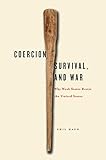Coercion, survival, and war : why weak states resist the United States / Phil Haun.
Material type: TextSeries: Publication details: Stanford, California : Stanford University Press, (c)2015.Description: 1 online resource (xii, 271 pages) : illustrations, mapsContent type:
TextSeries: Publication details: Stanford, California : Stanford University Press, (c)2015.Description: 1 online resource (xii, 271 pages) : illustrations, mapsContent type: - text
- computer
- online resource
- 9780804795074
- U163 .C647 2015
- COPYRIGHT NOT covered - Click this link to request copyright permission: https://lib.ciu.edu/copyright-request-form
| Item type | Current library | Collection | Call number | URL | Status | Date due | Barcode | |
|---|---|---|---|---|---|---|---|---|
 Online Book (LOGIN USING YOUR MY CIU LOGIN AND PASSWORD)
Online Book (LOGIN USING YOUR MY CIU LOGIN AND PASSWORD)
|
G. Allen Fleece Library ONLINE | Non-fiction | U163 (Browse shelf(Opens below)) | Link to resource | Available | ocn910623167 |
Includes bibliographies and index.
A theory of asymmetric interstate coercion -- Survival and coercion failure -- The United States vs. Iraq : the Gulf and Iraq Wars -- The United States vs. Serbia : Bosnia and Kosovo -- The United States vs. Libya : El Dorado Canyon, Pan Am flight 103, and WMD.
In asymmetric interstate conflicts, great powers have the capability to coerce weak states by threatening their survival-but not vice versa. It is therefore the great power that decides whether to escalate a conflict into a crisis by adopting a coercive strategy. In practice, however, the coercive strategies of the US have frequently failed. In this volume, Phil Haun chronicles 30 asymmetric interstate crises involving the US from 1918 to 2003.
COPYRIGHT NOT covered - Click this link to request copyright permission:
There are no comments on this title.
